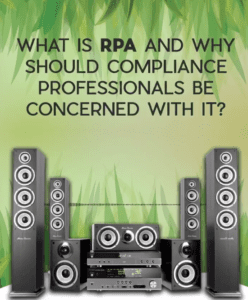Buzzwords like AI and machine learning tend to grab the attention of C-suite leaders, but the most exciting tool in the digital transformation toolbox is RPA, robotic process automation. Anthony Macciola defines RPA, discusses the realities of machine learning and covers strategies for driving content intelligence.
There has been no other new regulation in recent years that has made organizations worldwide in every industry more concerned than the EU’s General Data Protection Regulation (GDPR). Effective May 25, 2018, it expands the rights of individuals to control how their personal information is collected and processed and forces organizations to be more accountable for data protection. Violators risk a minimum fine of at least €20 million or 4 percent of global revenue, so naturally, global organizations are turning to technology to help ensure compliance.
At the root of GDPR is personal data that directly or indirectly identifies a natural person in any format. It mandates that organizations cannot keep data and content forever and advocates better records management and strong information governance. That, however, is where the compliance challenge lies: information is locked inside of documents. Many organizations are turning to robotic process automation (RPA) to help unlock information from documents in any format – whether structured or unstructured, digital or not.
RPA Defined
RPA is the application of technology that uses software robots to interact and perform specific tasks within existing applications, much like employees do for processing a transaction, manipulating data, triggering responses and communicating with other digital systems. The value of RPA has been driven by its ease of use and the quick ROI that can be achieved. Both business and technical users can build robots without the need for costly and time-consuming coding. Like most technologies, there are various levels of capabilities available to meet various needs. With RPA, there are three levels: basic, enhanced and cognitive.
Basic RPA focuses on automating simple, repeatable, rules-driven processes, providing recorders to capture and imitate what a user does; extracting data from application screens, workflow automation, Visio-type building blocks and reusable components; and using robots to execute those processes independently or as part of a larger business process. The robots eliminate the “swivel chair” processes for data entry commonly seen in banking, insurance, logistics and transportation, as well as in finance for invoice processing.
Enhanced RPA addresses automation of processes that often involves less structured, more specialized content. Tools and platforms supporting enhanced process automation offer some capabilities such as out-of-the-box, built-in knowledge; an understanding of natural language; ability to consume and leverage unstructured data; automated learning capability; pattern recognition; and e-bonding capabilities to other well-established software platforms.
Cognitive RPA combines advanced technologies such as natural language processing, artificial intelligence, machine learning and data analytics to mimic human activities such as perceiving, inferring, gathering evidence, hypothesizing, reasoning and interacting with human counterparts. Envision the capabilities in self-driving vehicles where systems are taught rather than programmed, a process that can take months to years depending on the complexity of the problem domain.
Cognitive RPA requires the largest investment in time and dollars, but it simultaneously has the greatest potential to transform. Industries that have a high quantity of available data are highly regulated and strive for continuous improvement will benefit most from cognitive automation.
GDPR and Information Management
Aragon Research predicts that by May 2018, only 55 percent of enterprises will be GDPR compliant. In relation to information management, this means organizations will not know or be able to protect complete data supply chains, including transfers, and will not have prior knowledge of all subject data location and its lineage. By incorporating RPA with intelligent capture solutions, organizations can derive content analytics to gain insights from content. This enables enterprises to search, manage and understand content that is working in a business process, such as clauses that allow deals to close versus get rejected. Content analytics could identify potential GDPR violations automatically and route exceptions to a staff member to resolve issues.
The following are five specific ways content analytics can aid in GDPR compliance efforts:
1. Identifying Meaningful Insights
Organizations must be able to identify key pieces of information within every document, file and object analyzed. It can include any terms that have specialized meaning or significance with the domains (for example, terms related to protected classes in human resources documents). The advantage of automated processes enabled by RPA and intelligent capture is real-time access to information in an easily traversable, hierarchical map, and the system is proactively extracting, classifying and presenting critical insights to the user.
2. Establishing a Record Policy
In the normal course of business, organizations capture data containing personally identifiable information (PII) and need to recognize procedures to ensure they are compliant. RPA and intelligent capture solutions can auto-classify a document and extraction data and apply a record policy to help meet GDPR. If PII data does not meet an established policy, an alert could be generated to intercept and resolve the issue.
3. Aggregating Content
All content within an organization should be accessible in aggregate form based on rules-based terminology. Standardizing terminology across input sources enables content repositories to connect; this is especially helpful for disparate source types.
4. Event-Driven Aggregation
Content relevant to a specific internal or external event – such as a merger or a sale to specific customers – can be aggregated in real time. This is especially useful if an organization needs to look into fraudulent activity.
5. Tracking and Comparing
Users can track changes to a unit of content and compare versions or different content files with respect to specific concepts or clauses.
GDPR will touch nearly every business unit in the enterprise and nearly every contract, including financial, legal, procurement, human resources, sales and marketing, making the accessibility of the data contained within these contracts crucial to compliance. Additionally, it thrusts a new wave of importance over records management, which has evolved to become more sophisticated with the incorporation of intelligent capture, RPA, machine learning insights and AI capabilities. As the GDPR deadline nears, organizations should consider investing in technology that leverages RPA and intelligent capture to gain content analytics.
More about Robotic Process Automation (RPA) and Compliance in this episode of the “Compliance in the Weeds” podcast:




 Anthony Macciola is the Chief Innovation Officer at
Anthony Macciola is the Chief Innovation Officer at 






